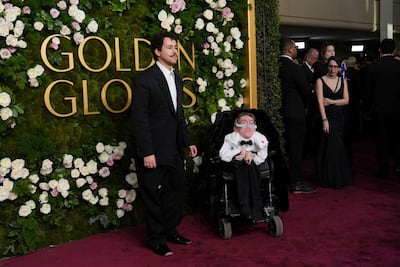Awards season 2025 is now officially in full swing, but there is one glaring question that needs to be answered: will Hollywood go quiet on Gaza?
That certainly was the case at the Golden Globes. During the three-hour ceremony held at the Beverly Hilton in Los Angeles, the Gaza war was not even alluded to. On the red carpet, only three celebrities wore Artists for Ceasefire pins: Guy Pearce, Ayo Edebiri and Steve Way, who stars in Ramy, and attended the event with Egyptian-American comedian and nominee Ramy Youssef.
This is a far cry from the awards ceremonies of last year, where the ongoing tragedy in Gaza was seemingly omnipresent. At the Academy Awards last March, for example, a wide number of attendees wore the red pins of the Artists4Ceasefire group, which stands for the “collective support for an immediate and permanent ceasefire, the release of all of the hostages and for the urgent delivery of humanitarian aid to civilians in Gaza”.
Youssef, who has long been one of the most vocal members of the group, spoke pointedly about the movement on the Oscars red carpet, saying at the time “We're using our voices to speak to people's hearts. We want people to have safety and justice,” he said.
But this year, he made no such public declarations on the red carpet. One can only imagine what Youssef may have said in his acceptance speech had he won the award for best stand-up comedy special, but the prize went to Ali Wong instead.
A similar scene played out in September at the Emmys, at which Youssef lost the award for best director, and no other speaker mentioned or alluded to the situation in Palestine.
It’s hard to say how much of this silence is only a matter of personal choice. After all, at the Cannes Film Festival last May, there were overt directives to not make political comments. Are similar edicts being made to attendees of award shows?

Outside of the awards circuit, there does appear to be a conscious silencing of voices for peace in effect, however soft their calls.
Several months ago, Golden Globe nominee Kate Winslet was a guest on The Late Show with Stephen Colbert. Speaking about her film Lee, a biography about war photojournalist Lee Miller, the British actress made indirect reference to the ongoing conflict in Gaza. She said: "Everyone has a right for their story to be remembered in conflict. And that is so relevant to today.” This quote was edited out from the interview when it was uploaded to the show’s official social channels only hours later.
During last year's awards season, the most vocal call for peace came from director Jonathan Glazer, whose film The Zone of Interest won at the Baftas and the Oscars. On stage at the latter event, Glazer said: “Our film shows where dehumanisation leads at its worst. It shaped all of our pasts and present. Right now, we stand here as men who refute their Jewishness and the Holocaust being hijacked by an occupation that has led to conflict for so many innocent people.”
Glazer’s comments were met with condemnation from many, with an open letter signed by 1,000 people in the film industry, though some names were of questionable legitimacy. Though Variety deleted the list after initially publishing it, the message was clear.

Since that incident, there has been far fewer bold moments in support of Palestine such as Glazer’s. What’s grown from that act of intimidation is a powerful culture of fear.
Speaking to British-American journalist Mehdi Hasan in October, singer and actor John Legend spoke bluntly about the current mood in the American entertainment industry surrounding Gaza.
“They've seen people lose their agent or lose jobs from it,” Legend said. “They're afraid they'll suffer professional consequences.”
Regardless of the reasons for the current quiet in Hollywood on Gaza, that silence is powerful. The threats to the lives of innocent men, women and children in Palestine have not lessened. Only days ago, 26 Palestinians were killed in strikes.
The people of Palestine need the cries of the world against injustice to echo now more than ever. We must hope that as awards season progresses, and artists once again have the world’s eyes on them, they find the courage to speak out for the people of Gaza, as any form of protest for peace might help save lives.


